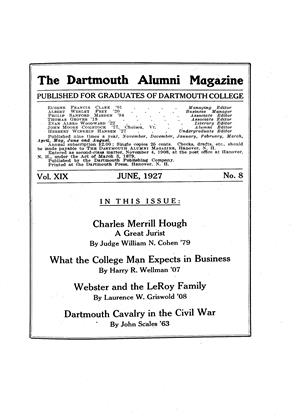There is a notable tendency among the editors of undergraduate newspapers in the various colleges to fare afield in the matter of editorial comment, not confining their editorial pronouncements exclusively to matters peculiar to the campus and the college, but extending it to affairs outside, notably of politics and foreign relationships. This we believe to be beneficial in the main, and it has been interesting to note the efforts of the DailyDartmouth—which, by the way, is a member of the Associated Press and therefore not a mere parietal organ—in this very direction. It is not that one views with especial conviction the outgivings of young men barely of voting age concerning problems which tax the powers of mature statesmen ; but rather that this endeavor to consider broader topics than those which arise out of the immediate environment is in itself formative and on the whole appropriate, especially on the part of young men who may expect to devote their efforts in later life to editorial work.
There is a tendency among seasoned newspaper workers to look with distrust on ''schools of journalism," but there is nowhere any doubt that the time spent in the actual work of combining and publishing a college daily paper is sound practical training for what may be somewhat priggishly called the "journalistic profession." There is no good reason, perhaps, why those intending to enter that profession should not be schooled to it, as lawyers and physicians are schooled, since even the latter require a long experience in actual practice to qualify them; but the fact is that thus far the working newspaper men of the United States react unfavorably to the abstract idea of a professional school dealing with their activities and see more benefit in the rudimentary efforts which actual conduct of a college paper entails. If Dartmouth ever saw fit to offer courses in journalism, it would be eminently desirable to include therein the practical work which the DailyDartmouth requires.
The late Edward Page Mitchell used to say that if he were to inaugurate a school of journalism he would charter a commodious ship and take his students on a two-years' cruise around the world, holding that thereby a better all-around training could be had than by any other method. There is much truth in that, and if the young men who hope to enter upon editorial work after graduation are so fortunately placed as to be able to supplement actual labors on the college newspapers by taking an occasional vacation trip to Europe their preparation will be even better. But the prospect of entering upon "journalism"—the word is disapproved by most newspaper workers, by the way—is the greatest of all incentives to seek a genuinely liberal education, from which the ancient classics are by no means to be excluded, while still in college. The best special training for newspaper work is not to specialize.
 View Full Issue
View Full Issue
More From This Issue
-
 Article
ArticleTHE UNDERGRADUATE CHAIR
June 1927 -
 Article
ArticleWHAT THE COLLEGE MAN EXPECTS IN BUSINESS
June 1927 By Harry R. Wellman '07 -
 Article
ArticleATHLETIC COUNCIL REPLIES TO PRESIDENT HOPKINS
June 1927 -
 Article
ArticleSECRETARIES ASSOCIATION MEETS IN HANOVER
June 1927 -
 Article
ArticleDARTMOUTH CAVALRY IN THE CIVIL WAR
June 1927 By John Scales '63 -
 Article
ArticleCAN CHINA SURVIVE
June 1927
Article
-
 Article
ArticleA Unique Company
JUNE, 1927 -
 Article
ArticleTRUTH, BEAUTY, AND GOODNESS
March 1934 -
 Article
ArticleDartmouth War Directory
October 1943 -
 Article
ArticleNew Faculty
March 1944 -
 Article
ArticleDean of Faculty for Arts and Sciences Named in Academic Reorganization
APRIL 1964 -
 Article
ArticleMedical School
October 1960 By HARRY W. SAVAGE M' 27


